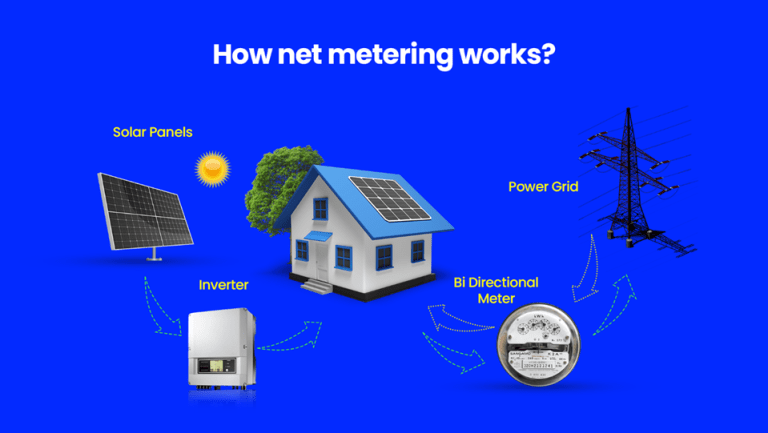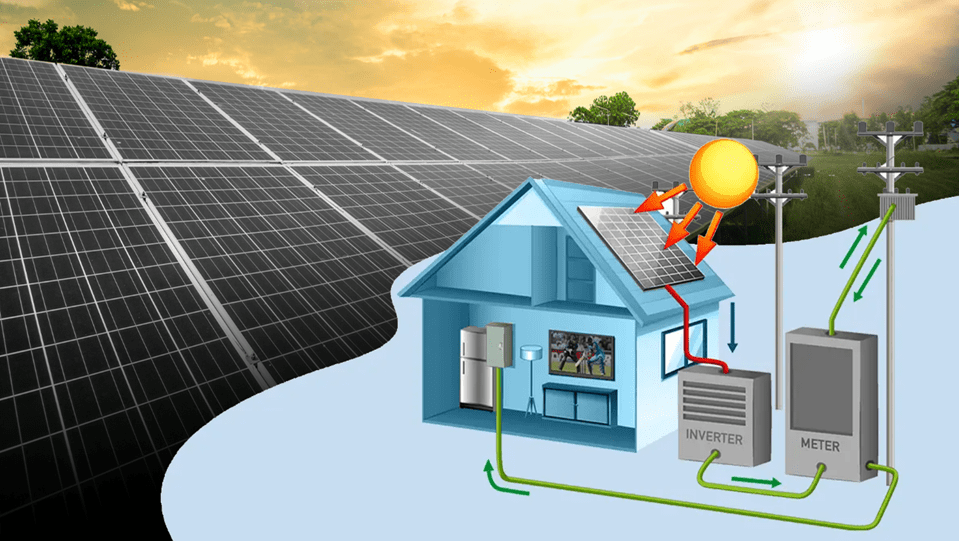- Published On:
Understanding Texas Net Metering Programs 2024
Solar energy is becoming popular across the U.S. as homeowners and businesses seek ways to lower their energy costs and reduce grid resilience. Many states offer solar incentives and rebates to help solar owners offset the upfront cost of installing a PV system. Texas Net Metering Program 2024 is also a great opportunity for going solar as you can earn credits by sending excess power back to the grid. With this, you will not only reduce high electric bills but also get credits for solar power generation. Net metering in Texas is different from other states that offer statewide policies. Unlike, the utilities mainly operate these programs. Hence, the net metering policies and compensation vary across utility providers in Texas. To make an informed choice, a solar user needs to understand these net metering policies to maximize the benefits of their solar investment.

In this article, we will guide you through how net metering works in Texas, about the performance-based incentives, and feed-in tariffs. Also, we will explore the net metering programs offered by utilities in Texas.
What is solar net metering?
Net metering is a process through which solar owners can send excess power their solar panels generate, back to the grid. In return, the grid will give them energy credits in their next electricity bills. This is one of the major benefits of solar that you do not need to pay extra to the grid with these credits when you use grid electricity in case of night or power outages. In Texas, the credits vary by utilities as some provide full credits equal to the electricity retail rate for each kilowatt-hour. Some other providers offer wholesale rates that may be lower than retail. However, for a homeowner or business, it is vital to learn which utility is good for you while installing solar in Texas.

What are the Texas net metering rules?
Texas is one of the best solar states that does not have any statewide net metering policy. Instead, Retail Electric Providers (REPs) and municipal utilities offer solar buyback plans and net metering credits around the state. Let’s have a look at the basic net metering rules in Texas:
Standard Credits: If your solar production does not exceed the consumption, you will only need to pay for the net energy use.
Excess Credit: If your home energy system produces more power than your energy needs, you will get credits depending on your utility policies. Some providers reset credits every month while others roll over them in the next months. However, only a few pays you cash in return for excess power.
What is Feed-In Tariffs (FITs)?
Feed-in tariffs, often known as FITs, are prices that apply to excess power exported to the grid. A feed-in tariff has a different price tag on excess generation than typical net metering, which values your usage and solar output equally. Utility providers may set FITs higher to encourage solar generation in new markets, even though they are typically lower than the retail kWh price. Additionally, you will get traditional net metering if the retail kWh price and the FIT are equal. However, your power provider may offer hybrid programs. You may get net metering at full retail price when your solar power generation is less than usage leading to a lower feed-in tariff.
What Is Performance-Based Incentives in Net Metering?
These incentives refer to the rewards depending upon your total solar output instead of excess power generation. It depicts that you will get incentives for how much your solar energy system produces not on what you send back to the grid.
Austin Energy’s Value of Solar (VOS) Tariff is an example of a performance-based incentive. You receive a 9.91 cent/kWh power bill credit for using all of your solar energy, not just the excess.
What are some major Texas net metering programs?

Lubbock Power and Light Net Metering
In January 2024, Lubbock Power and Light completed its deregulation process and stepped into the local electricity market competition. Like Oncor and CenterPoint, LP&L works as an independent grid operator in Texas. It offers solar customers competitive buyback plans in Lubbock and net metering credits to maximize their solar savings.
San Antonio: CPS Energy Net Metering
CPS Energy offers a net metering program for San Antonio solar owners. According to its policy, you will get the credits at full price in case of power generation below the usage. Like if you consume 800kWh from the grid and export 700kWh of excess power, you will get your bill for 100kWh. On the other hand, if generation exceeds consumption, the surplus will get credit at the avoided cost rate. This is the amount CPS Energy would have to pay to get that electricity from power plants.
Moreover, CPS Energy also provides solar rebate programs for small businesses, schools, and nonprofit organizations. The incentive is $0.40/watt for any capacity over 25 kW and $0.60/watt up to 25 kW, with a system size limit of 100 kW.50% of the project’s costs up to a limit of $80,000 (whichever is less) is the incentive ceiling.
El Paso Electric Company Net Metering
El Paso Electric (EPE) is offering a net metering program of up to 50 kW to residential solar owners. However, you cannot oversize your solar PV system. It must be according to your power usage in the year before installation. The electricity will get credit at a retail price and you may decrease your electricity bill to $30.25 per month. At $50, EPE will compensate you for any credits you have accrued. If you need a bidirectional power meter, EPE will install it for the customer at no additional expense.
Brownsville Public Utilities Board (PUB)
Over 6,300 commercial customers and close to 50,000 residential customers are served by the Brownsville Public Utilities Board. Brownsville PUB employs both direct-ownership power facilities and wholesale electricity purchases to supply its customers. They charge residential customers the following power tariff as of September 2023:
- $6.94 fixed customer charge
- $0.04862/kWh up to 500 kWh
- $0.05964/kWh for consumption over 500 kWh
- Variable fuel and purchase energy charge (FPEC), $0.05658/kWh as of September 2023
- In other words, the first 500 kWh are billed at $0.1052/kWh, and the price increases to $0.11622/kWh for consumption over 500 kWh.
Also, Brownsville PUB offers a net metering plan for small wind turbines and solar panel installations. The City of Brownsville Building Permit Division must approve both types of systems, and excess power needs to get credit at the Fuel & Purchase Energy Charge (FPEC). The cost of changing to a bidirectional power meter is covered by an upfront deposit of $100.
Entergy Texas: Net Metering in Beaumont
Entergy Texas is a part of the Midcontinent Independent System Operator (MISO). It is independent of ERCOT and works on FERC regulation. It covers the eastern cities of Texas like Beaumont. This utility offers two types of net metering plans depending on the capacity of your solar system. Under 100kW solar panel systems qualify for Schedule SQF while over 100kW systems under Schedule LQF. In SQF, the net metering credits are considered at an avoided-cost rate. Also, they will calculate as per on peak and off-peak prices. If your credits exceed $50, you can receive a check otherwise it will roll over to your next bill. SQF users pay a service fee of $12.35 to $22.65 based on voltage.
Schedule LQF (>100 kW) also covers solar buyback; however, Entergy Texas determines the price per kWh paid to each customer separately. Entergy utilizes the system operator’s (MISO) energy settlement data to calculate the monthly avoided cost.
City of Brenham Net Metering
Like EPE, the City of Brenham Electric Department offers net metering in Texas. Solar generation that falls short of your monthly usage is credited at full price. Whereas excess energy is credited at the avoided cost rate, which is reviewed and revised every year.
In conclusion, although there is no statewide Texas net metering policy there are many utilities that are offering solar buyback plans in Texas and other solar incentives. To encourage solar adoption, utility providers are helping homeowners and businesses offset their solar upfront with solar rebates and hybrid net metering programs. By making an informed decision about choosing your utility and net metering plan, you can maximize your solar savings for the future.
SolarSME is a top solar installer in Texas, offering the best residential and commercial solar solutions. Book a FREE appointment for assistance.
Related Articles:
Solar net billing in Arizona is also a compensation program for solar owners who transfer the excess solar energy to the grid. When your solar panels in Arizona overproduce power on sunny days, you can earn credits from your utility by flowing extra power to the grid. In this article, we will take you through the ins and outs of net billing in Arizona so you can make informed decisions.
Tesla Electric Virtual Power Plant aims to utilize customer devices like battery storage in the wholesale power market to improve grid stability. As compensation, the customers will be paid. Tesla Electric Virtual Power Plant is providing this opportunity to its Powerwall customers. Now, Tesla Powerwall owners in Texas may participate. Learn more about the benefits, eligibility, and participation criteria!
The business sector is facing high energy costs and incurring millions of dollars in losses due to the aging and unstable power grid. Also, due to climate change, long power outages are now a new normal. Explore best solar incentives for businesses in Texas!



